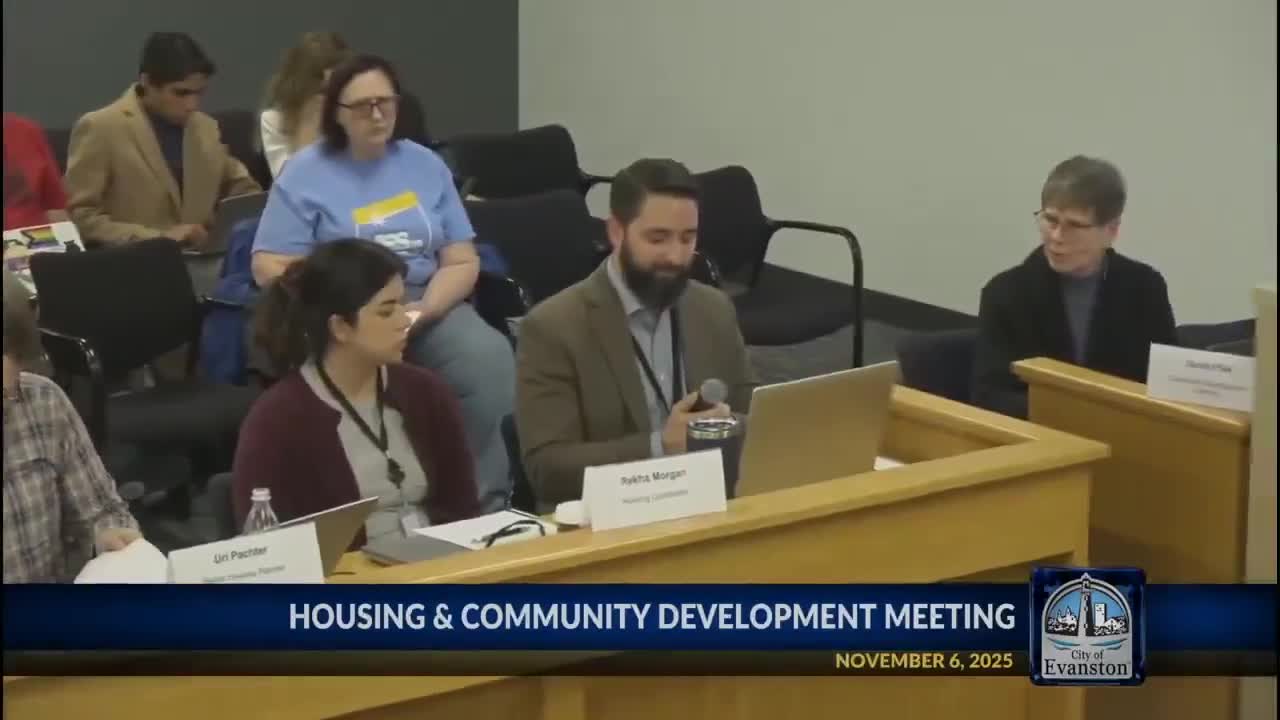Evanston committee weighs caps, enforcement and definitions in short-term rental draft ordinance
Get AI-powered insights, summaries, and transcripts
Subscribe
Summary
The Housing and Community Development Committee on Nov. 6 examined a staff draft ordinance that would regulate short-term and vacation rentals in Evanston, asking staff to return with a revised version that addresses definitions, geographic concentration and enforcement.
The Housing and Community Development Committee on Nov. 6 examined a staff draft ordinance that would regulate short-term and vacation rentals in Evanston, asking staff to return with a revised version that addresses definitions, geographic concentration and enforcement.
Andrew Sanderoman, building and development services manager, told the committee staff had revised the draft to remove an ‘‘owner-occupied’’ definition and to apply standards to all short-term rentals. Staff proposed a maximum of 25 short-term rental licenses per ward but asked the committee for direction on that number. Sanderoman said staff found about 135 distinct full-unit listings on hosting platforms and 78 currently licensed short-term rental units.
Committee members questioned both the proposed per-ward cap and the definition of short-term rental. Several members urged clearer language so that furnished month-to-month apartments used to house students or international residents would not be swept into a short-term category intended for platform-listed units such as Airbnb or VRBO. "The intention is short-term rentals that are listed on those hosting platforms," Sanderoman said, while noting some listings have stays longer than 30 days and that staff will refine the definition.
Council member Rogers said he favored lowering the cost of entry for lawful hosts and using stronger penalties for violations, while also wanting staff to analyze how many licensed units currently exist and where they are concentrated. "If there are 25 per ward and I have the advantage of getting 10 of those licenses, I really kind of own the monopoly," Rogers said, urging legal review of ownership limits.
Assistant City Attorney Catherine Penrose cautioned that limiting ownership could be legally complicated because many property owners use series LLCs for liability management, which can make simple ownership caps ineffective. Penrose recommended further legal review.
Other ideas raised by committee members included:
- Using distance or spacing requirements (for example, a minimum distance between licensed short-term rentals) instead of a rigid per-ward cap to avoid a single block being dominated by rentals. - Adding a rule requiring listings to display the city license number so residents and enforcement staff can more easily verify compliance. - Requiring use of vetted software by hosts to simplify reporting, tax remittance and enforcement. - Strengthening revocation/suspension language; staff noted section 5-9-9 already empowers the city manager to revoke or suspend licenses for nuisance conditions, condemned or dangerous buildings, or vacant buildings.
Several members said neighborhood-level impacts rather than a simple numerical cap should be a core concern. "I think it would be awful to have 10 of them on 1 block," one member said, urging tools to analyze cumulative negative effects.
Timing and moratorium: Committee members discussed the existing moratorium on new short-term rental licenses and whether to extend it while staff refines the ordinance. Staff reported the moratorium's near-term expiration and said the committee could ask council to extend the moratorium while the ordinance is revised. Committee members asked staff to map the listings and provide more detailed ward-by-ward counts and enforcement options.
Outcome and next steps: The committee referred the proposed amendments for discussion; members asked staff to return with a revised ordinance that clarifies the short-term rental definition, provides alternatives to a uniform per-ward cap (including distance/spacing options or a citywide cap), details enforcement mechanisms (including listing license numbers and vetted software), and outlines administration of any cap (first-come-first-served vs. other methods). Staff said it would aim to prepare a second draft for council consideration and recommended timing options for introduction and any moratorium extension.
The committee did not take a final vote on the ordinance at this meeting.
